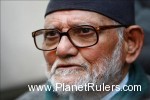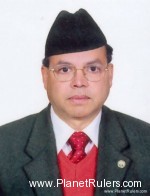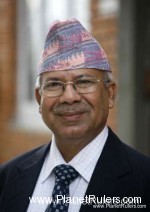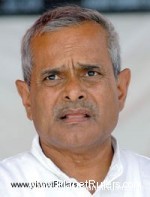
October 2, 2015 update: Sushil Koirala announced his resignation!
Sushil Koirala was born to Bodh Prasad Koirala and Kuminidi Koirala on 12 August 1939 (२८ श्रावण १९९६). Koirala is unmarried and known to live a simple life. A member of the politically prominent Koirala family, he is the cousin of former prime ministers Matrika Prasad Koirala, Girija Prasad Koirala and Bishweshwar Prasad Koirala. He has three sisters: Lt. Dyuthi Devi Sharma (married to Ranga Nath Sharma, a member of the Prachanda Gorkha Party, the first political party of Nepal), Abha Devi Sharma, and Sashi Sharma. He has five brothers: Lt. Pramod Kumar Koirala, Lt. Binod Koirala, Dr. Arun Koirala (NC District President Banke), Ashok Koirala (MP-NC and formal NC District President Morang) and Er. Bijay Koirala. Mr Koirala was diagnosed with lung cancer.
Koirala entered politics in 1954 inspired by the social-democratic ideals of the Nepali Congress. He was in political exile in India for 16 years following the royal takeover of 1960. Koirala also spent three years in Indian prisons for his involvement in a plane hijacking in 1973. While in exile, Koirala was the editor of Tarun, the official party publication. He has been a member of the Central Working Committee of the party since 1979 and was appointed General Secretary of the party in 1996 and Vice President in 1998.
In 2001, he lost the contest for the Nepali Congress Parliamentary Party leader to Sher Bahadur Deuba. Koirala was appointed acting President of the party in 2008 by President Girija Prasad Koirala. On September 22, 2010, the 12th general convention of the Nepali Congress elected him as party President.
The Nepali Congress emerged as the largest party in the 2013 Constituent Assembly elections under Koirala’s leadership. He was elected leader of the Nepali Congress Parliamentary party securing 105 out of 194 votes against former Prime Minister Sher Bahadur Deuba’s 89 votes and on 10 February 2014 he was nominated as Prime Minister.
Source: http://en.wikipedia.org/wiki/Sushil_Koirala
Jhala Nath Khanal, Former Prime Minister of Nepal (elected on Feb 3, 2011)
Jhala Nath Khanal (born 20 May 1950) is a Nepalese politician who has been Prime Minister of Nepal since February 2011. He is Chairman of Communist Party of Nepal (Unified Marxist–Leninist) (CPN (UML)) and Leader of Constituent Assembly Parliamentary Party of CPN (UML).
Born on May 20, 1950 at Sakhejung in Ilam district, Khanal was a member of the Communist Party of Nepal (Marxist-Leninist). and was its General Secretary from 1982 to 1986. Later, he was a member of the CPN (UML).
Khanal won the seat of Ilam-1 constituency in 2008 Constituent Assembly election. He led the CPN (UML) as General Secretary from 2008 to February 2009. He was elected as the Chairman of the CPN (UML) on February 16, 2009.
He served for a time as Minister of Information and Communication.
On 3 February 2011, after seven months of political gridlock in the country, Jhala Nath Khanal was elected Prime Minister of Nepal by the Parliament.
Madhav Kumar Nepal, Former Prime Minister of Nepal
1953: born in Gaur-8 Rautahat district
Marital status: Married, survive with wife, one daughter and one son
1968: worked in civil and banking service
1969: became member of the Communist Party of Nepal (PL Group)
1973: graduated in management from Tribhuvan University
1974: quit civil and banking career
1976: arrested under Treason Act and imprisoned for two years
1978: became founding politburo member of the CPN-ML
1990: worked as a member of the central high command for the People’s Movement and a member of the Constitution Recommendation Commission
1991: served as a leader of the opposition party in the upper house for the next seven years
1993: took on the responsibility of the party’s General Secretary
1994: served as deputy prime minister, defense and foreign affairs minister
1999: elected as a member of the House of Representatives from Rautahat
2008: quit the post of the party general secretary after defeat in the Constituent Assembly elections
May 25, 2009: took office of the Prime Minister of Nepal
LINK: http://www.nepalmountainnews.com
Ram Baran YADAV, President of Nepal
Baran Yadav became Nepal’s first president following his victory in the presidential run-off in the country’s powerful assembly.
Yadav was born on 4 February 1948 in the small village of Sapahi in Dhanusha district in south-eastern Nepal and was the fourth son of Thani and Ramrita Yadav.
He received his schooling and higher education in Kathmandu before pursuing his interest in medicine in India.
Yadav completed his MBBS from Calcutta Medical College in India and then went on to receive his MD from the Post Graduate Institute of Medical Research in Chandigarh of India.
Although a successful medical doctor, Yadav was never far from politics.
He began his association with Nepalese politics when he led anti- government protests as a student leader in 1960 following the outlawing of political parties by the then king Mahendra.
Yadav was at the forefront of every pro-democracy movement the country has seen in the past 30 years.
He served two terms as the health minister in the 1990s and currently is the Nepali Congress general secretary.
Yadav represents the ethnic Madhsi community of southern Nepal.
His election as the country’s first president was a twist of fate and an unexpected development following a new alliance between the Nepali Congress, the Communist Party of Nepal – Unified Marxist Leninist (CPN-UML) and the ethnic Madhesi People’s Rights Forum.
The alliance sprung up just a day before the end of the deadline to nominate candidates after CPN-UML and the Madhesi People’s Rights Forum accused the Maoists of betrayal.
LINK: http://www.monstersandcritics.com
Girija Prasad Koirala, Former Prime Minister of Nepal
Date of Birth :
1925 A. D.
Parents:
Late Mr K.P. Koirala
Late Mrs divya Koirala
Daughter:
Ms Sujata Koirala
Designation:
Prime Minister of Nepal
President, Nepali Congress Party
Political Background:
Started political career joining the Indian Freedom Struggle and the historic Nepalese Revolution against Rana regime by organizing the first Labour’s Movement in Biratnagar Jute Mill in 1947-48.
1948 Founding Member and President of Nepal Trade Union Congress (erstwhile Nepal Mazdoor Congress).
1952-1960 President, Morang District, Nepali Congress 1960-1967 Imprisoned after 1960 coup. Spent seven years in prison, During the jail, sustained 21 days Hunger Strike.
1968 Exiled in India along with senior Nepali Congress Party leaders and workers.
1979 Returned to Nepal with the Programme of National Reconciliation propounded by
B.P. Koirala.
1975-1991 General Secretary of Nepali Congress Party.
1987 Senior Leader of the peaceful “Satyagraha” (Civil Disobedience) movement and put under “house arrest” for nine months. 1990 Senior Leader and Nepali Congress Party General Secretary during the popular “Jana Andolan” (Mass Movement), which restored the Multi Party System in Nepal.
1991 Elected Member, House of Representatives from Morang-1 and Sunsari-5.
1991 Elected as leader of Parliamentary Party of Nepali Congress Party.
1991-1994 Appointed as Prime Minister of Nepal.
1994 Elected Member, House of Representatives from Morang-1 and Sunsari-5 in mid-term election.
1995 Elected as President of Nepali Congress Party.
1997 Elected as Leader of the Parliamentary Party of Nepali Congress Party.
1998-1999 Prime Minister of Nepal.
1999 Elected Member, House of Representatives from Morang-1 and Sunsari
2000 Elected as Leader of the Parliamentary Party of Nepali Congress Party.
2000 Elected as Prime Minister of Nepal.
2001 Elected as President of Nepali Congress Party.
2005 Elected as President of Nepali Congress Party.
2006 Leader of People’s Movement initiated by Seven Party Alliance (SPA)
2006 April 28
Prime Minister of Nepal.
Hobbies:
Reading contemporary biographies of renowned political personalities, short stories, political memoirs.




